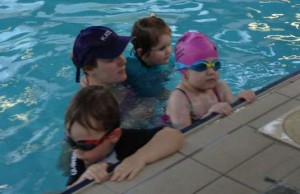Sorenne has been taking swimming lessons at this huge outdoor pool complex for over a year, and even with all the babies, I haven’t seen poop in the pool.
But it happens, as shown by all those summertime Cryptosporidium outbreaks  linked to pools, and according to CDC, it happens a lot.
linked to pools, and according to CDC, it happens a lot.
So in honor of the ninth annual Recreational Water Illness and Injury Prevention Week, the U.S Centers for Disease Control has concluded that 58% of water samples from public pools tested positive for E. coli, bacteria commonly found in human feces.
CDC says its findings indicate that swimmers are contaminating the water either through “fecal incidents” in the pool, or because they haven’t showered properly and the germs remain on their body when they enter the water.
The results are based on 161 filter samples from public swimming pools in the Atlanta area.
And there’s not just poop in the pool; 59% of water samples also tested positive for Pseudomonas aeruginosa, which can cause skin rashes and ear infections.
Here’s what the CDC recommends swimmers do to stay healthy and keep others healthy – whether swimming in a pool, lake, river or ocean (or using a hot tub):
— Stay out of swimming water when you have diarrhea.
— Shower with soap before swimming.
— Take children for bathroom breaks every 60 minutes.
— Wash your hands with soap after using the toilet or changing diapers.
 — Avoid changing diapers next to the pool.
— Avoid changing diapers next to the pool.
— Avoid swallowing the water.
And according to NPR, the CDC knows you pee in the pool, too. The nitrogen in urine depletes free chlorine in pool water, making it harder to kill germs. Nitrogen also converts the chlorine into a form that irritates the eyes and lungs. So stop doing that.
